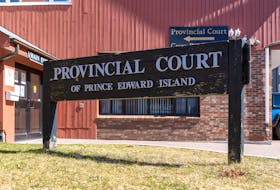Noel Ayangma has been unsuccessful in his attempt to seek $425,000 in damages for what he claimed was a defamatory column in The Guardian commenting on his use of the judicial system.
Ayangma argued in the Supreme Court of P.E.I. in late August that an opinion piece written by former Guardian columnist Barb McKenna in May 2016 was both defamatory and negligent. He also named Guardian reporter Ryan Ross in the suit for an article Ross wrote about the decision of the Supreme Court that Ayangma was practising law contrary to the Legal Profession Act.
The latter decision was subsequently reversed on appeal and referred back to the Supreme Court for a new hearing.
In his action against The Guardian, Ayangma told the court several portions of the column, and the piece as a whole, unfairly – and inaccurately – paint him in a negative light.
Justice Nancy Key granted SaltWire’s motion for summary judgement, ruling Ayangma’s statement of claim is statute barred because it was outside the limitation period set out in the Defamation Act.
Ayangma served notice on the SaltWire Network, which owns The Guardian, on Oct. 16, 2017, and filed his statement of claim on Oct. 30, 2017, more than 17 months after the publication of the alleged defamatory material.
The legislation requires notice within three months of the date the column “comes to his notice or knowledge.”
The judge ruled the summary judgment makes it unnecessary for her to consider whether or not the article and column were defamatory.
She dismissed Ayangma’s motion for full or partial summary judgment.
Key ruled SaltWire shall have its costs on a partial indemnity basis, instructing the parties to make an effort to agree on the costs.
If they are unsuccessful in coming to an agreement, then either party may apply to the court for directions, Key stated in her 19-page written decision handed down on Thursday.
While Key chose not to rule on whether or not the articles were defamatory, she did provide considerable assessment of Ayangma’s affidavit.
The judge determined Ayangma expressed numerous opinions in his affidavit that were not based on fact or substantiated by any factual basis.
Key stated in her ruling that SaltWire Network lawyer David Hutt was correct in saying that much of the affidavit contains argument, opinion and even a bald allegation.
“The court attributes no weight to the points of argument contained in Mr. Ayangma’s affidavit, nor to the bald allegation ‘that the defendants are obsessed and eager to publish defamatory materials against me or decisions that go against me in a timely manner’.’’
McKenna’s column offered her opinions on Ayangma’s frequent practice of being a consumer of the court’s resources, often with unsuccessful outcomes, which has a direct cost to P.E.I. taxpayers.
The piece was also critical of Ayangma for trying to take on the role of lawyer when he was not qualified to do so.
Portions of Key’s decision have particular relevance to the media.
She ruled that in P.E.I., the online version of a newspaper is still a newspaper for the purposes of the Defamation Act. This is new law for the province, which adopts the substance of a decision in Ontario.
She agreed with Hutt’s contention that the limitation period for each of the impugned articles did not reset every day they remained available online.
Key also ruled a hyperlink, even to another page of the same website, does not mean the person creating the link is responsible for the linked content.









